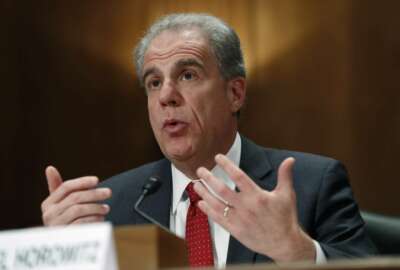OMB tells agencies to cooperate with IGs overseeing COVID-19 spending
The OMB memo sets a tone for cooperation as legislation to strengthen the independence and authority makes its way through Congress.
Best listening experience is on Chrome, Firefox or Safari. Subscribe to Federal Drive’s daily audio interviews on Apple Podcasts or PodcastOne.
The Biden administration is sending a message to agency leadership to cooperate with inspectors general.
The Office of Management and Budget last week issued new guidance for agencies on ways to strengthen the relationship between agency staff and IGs.
The OMB memo sets a tone for cooperation as legislation to strengthen the independence and authority makes its way through Congress. It also reflects feedback OMB got from the Council of Inspectors General on Integrity and Efficiency.
The Nov. 3 memo from acting OMB Director Shalanda Young and Deputy Director for Management Jason Miller directs agencies to “restore and respect the integrity and independence of their respective agency inspectors generals, and work with the Congress to ensure that IG offices can exercise their vital oversight role.”
“As leaders of your respective agencies, you and your staff have an obligation to cooperate with your respective IG offices as they fulfill their statutory responsibilities under the IG Act. In recent years, there have been concerns that executive branch agencies have not consistently provided their IGs with the full cooperation and access to which they are entitled under the law,” Young and Miller wrote in the memo.
CIGIE conducted a review of agency practices this spring, and found many agencies have not routinely communicated with staff about the role of IGs and their expectation for staff engagement with IGs.
“In some cases, agency leadership did not communicate to agency staff their endorsement of standing directives or policies related to IG independence, exchange of information among agency staff and the IG, and related whistleblower protections,” the memo states.
CIGIE determined agency leadership should set the expectation that employees cooperate with IG offices, inform staff of their rights to speak to IGs on whistleblower matters and stress the independent nature of IGs.
“The IGs require guarantees of independence to allow them to pursue their work without interference by executive branch officials or members of Congress,” the memo reads.
CIGIE Chairwoman Allison Lerner, the National Science Foundation’s IG, said the OMB memo emphasizes best practices developed across the IG community.
“CIGIE appreciates OMB’s efforts to ensure inspectors general receive the cooperation required by the Inspector General Act. The guidance issued today by OMB is unprecedented and will enhance the ability of OIGs to conduct the independent oversight that is needed to serve the interests of the American public,” Lerner said.
The memo also directs Miller, as CIGIE’s executive chairman and head of the President’s Management Council, to serve as a liaison between the IG community and agency leadership, and to bring both parties together to address critical issues.
The memo meets expectations for OMB set by Congress earlier this year. During confirmation hearings for OMB director nominee Neera Tanden, Sen. Jon Ossoff (D-Ga.) asked Tanden, if confirmed, to issue guidance to agency heads “that they should instruct their employees in all cases to comply with inspector general investigations, to promptly provide their agency IGs with such information, evidence, documentation as those inspectors general may request.”
Tanden told the committee she would issue such a memo to agencies if confirmed, but withdrew her nomination in March.
Liz Hempowicz, the director of public policy at the Project on Government Oversight, said the memo sets a clear tone from leadership that agencies should fully cooperate with watchdog requests.
“It is so, so, so important for agency leadership, for political leadership at these agencies, to hear from the White House, to hear from their boss, ‘I am telling you, I expect you to, and I will hold you accountable if you don’t cooperate with these independent watchdogs,’” Hempowicz said.
Beyond the day-to-day responsibilities of IGs, the administration sees this oversight work as crucial to minimizing fraud, waste and abuse of COVID-19 spending.
The memo highlights how the American Rescue Plan implementation coordinator and OMB brought together agencies and their IGs, as well as the Pandemic Response Accountability Committee to assess program design, financial controls and reporting measures prior to the release of funds from programs that were newly created, received a substantial increase in funding or required significant changes.
“This approach has resulted in strong collaboration and demonstrated the clear benefits from proactive and transparent engagement,” the memo states.
The PRAC, in its latest update to Congress, said 30 agency IGs produced nearly 120 oversight reports between April and September. More recently, the Small Business Administration’s IG found the agency last year issued more than $3 billion in Economic Injury Disaster Loans to potentially ineligible recipients that had not been checked against the Treasury Department’s Do Not Pay data sets.
Hempowicz, however, said these insights into pandemic spending from IGs shouldn’t suggest that there’s any increased tension between IGs and the agencies they oversee.
“I don’t see this necessarily as a signal that things are going wrong, so much as I as see it as a signal that things are going right. Inspectors general and their role in overseeing COVID spending, in particular, and now infrastructure spending, I think it has really connected the work of inspectors general to the public in a way that I think we hadn’t necessarily seen before,” Hempowicz said.
Congress, meanwhile, is moving ahead with legislation to strengthen the role of IGs and make them harder to fire.
The House in June passed the IG Independence and Empowerment Act, which would give IGs the authority to subpoena former federal employees and would require the president to provide a “substantive rationale” to removing an IG.
The Senate Homeland Security and Governmental Affairs Committee approved the legislation in November. The bill includes a provision from Sens. Maggie Hassan (D-N.H.) and Chuck Grassley (R-Iowa) that would streamline the burden of IGs submitting semiannual reports to Congress.
The provision addresses a top recommendation from a panel of former IGs by POGO that, in 2018, urged lawmakers to pass legislation that would reduce the number of reporting requirements for IGs.
“One of our biggest concerns is that current reporting requirements incentivize many IGs to spend a significant amount of time chasing “small-window” projects in order to boost their offices’ metrics in semiannual reports (SARs) to Congress,” the former IGs wrote.
Hempowicz said those former IGs stressed that streamlined semiannual reports would allow current watchdogs to focus on higher-value tasks.
“They pointed to the semiannual reporting requirements and said, ‘These are a huge time suck, they are a huge resource suck for our offices to put out duplicative reports now, with what we’re already publishing on Oversight.gov,” Hempowicz said.
Copyright © 2025 Federal News Network. All rights reserved. This website is not intended for users located within the European Economic Area.
Jory Heckman is a reporter at Federal News Network covering U.S. Postal Service, IRS, big data and technology issues.
Follow @jheckmanWFED






